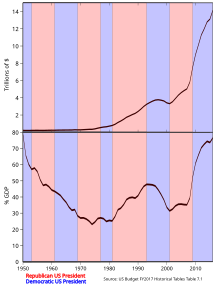ഇന്റർജനറേഷനൽ ഇക്വിറ്റി

| Youth rights |
|---|

സാമ്പത്തികവും മാനസികവും സാമൂഹികവുമായ സന്ദർഭങ്ങളിൽ തലമുറകൾ തമ്മിലുള്ള സാമൂഹ്യനീതിയുടെയോ ന്യായത്തിന്റെയോ ആശയമാണ് ഇന്റർജനറേഷനൽ ഇക്വിറ്റി. കുട്ടികൾ, യുവാക്കൾ, മുതിർന്നവർ, പ്രായമായവർ എന്നിവർക്കിടയിലുള്ള ചലനാത്മകതയിൽ ഈ ആശയം പ്രയോഗിക്കാവുന്നതാണ്. നിലവിൽ ജീവിക്കുന്ന തലമുറകൾക്കും ഭാവി തലമുറകൾക്കും ഇടയിലുള്ള നീതിക്കും ഇത് പ്രയോഗിക്കാവുന്നതാണ്.[1]
ഇന്റർജനറേഷൻ ഇക്വിറ്റിയെ കുറിച്ചുള്ള സംഭാഷണങ്ങൾ പല മേഖലകളിലും സംഭവിക്കുന്നു.[2] പൊതു സാമ്പത്തിക ശാസ്ത്രത്തിൽ പ്രത്യേകിച്ച് പരിവർത്തന സാമ്പത്തിക ശാസ്ത്രം,[3] സാമൂഹിക നയം, സർക്കാർ ബജറ്റ് നിർമ്മാണം എന്നിവയുമായി ബന്ധപ്പെട്ട് ഇത് പലപ്പോഴും ചർച്ച ചെയ്യപ്പെടുന്നു.[4]ഭാവി തലമുറകൾ അതിന്റെ അനന്തരഫലങ്ങൾ വഹിക്കുമെന്നതിനാൽ, വർദ്ധിച്ചുവരുന്ന യുഎസ് ദേശീയ കടം ഇന്റർജനറേഷൻ അസമത്വത്തിന്റെ ഉദാഹരണമായി പലരും ഉദ്ധരിക്കുന്നു. സുസ്ഥിര വികസനം,[5]കാലാവസ്ഥാ വ്യതിയാനം ഉൾപ്പെടെയുള്ള പാരിസ്ഥിതിക ആശങ്കകളിലും [6] ഇന്റർജനറേഷൻ ഇക്വിറ്റി പര്യവേക്ഷണം ചെയ്യപ്പെടുന്നു. കഴിഞ്ഞ നൂറ്റാണ്ടിൽ സംഭവിച്ചുകൊണ്ടിരിക്കുന്ന പ്രകൃതി വിഭവങ്ങളുടെ തുടർച്ചയായ ശോഷണം ഭാവി തലമുറകൾക്ക് കാര്യമായ ഭാരമായിരിക്കും. ഇന്റർജനറേഷൻ ഇക്വിറ്റി ജീവിത നിലവാരവുമായി പ്രത്യേകിച്ചും വ്യത്യസ്ത പ്രായത്തിലും തലമുറയിലും ഉള്ള ആളുകൾ അനുഭവിക്കുന്ന ജീവിത നിലവാരത്തിലെ അസമത്വങ്ങളെ കുറിച്ച് [7][8][9]ബന്ധപ്പെട്ട് ചർച്ച ചെയ്യപ്പെടുന്നു. വയോജന പരിപാലനത്തിന്റെയും സാമൂഹിക നീതിയുടെയും മേഖലകളിലും ഇന്റർജനറേഷൻ ഇക്വിറ്റി പ്രശ്നങ്ങൾ ഉയർന്നുവരുന്നു.
പൊതു സാമ്പത്തികശാസ്ത്രത്തിന്റെ ഉപയോഗം[തിരുത്തുക]
ചരിത്രം[തിരുത്തുക]
ബിസി 1796-ൽ സുമരിയയിൽ ആദ്യമായി രേഖപ്പെടുത്തിയ കടം ഇഷ്യൂ ചെയ്തതു മുതൽ,[10] വായ്പ തിരിച്ചടക്കുന്നതിൽ പരാജയപ്പെടുന്നതിനുള്ള പിഴകളിൽ ഒന്ന് കടബാധ്യതയാണ്. ചില സന്ദർഭങ്ങളിൽ, സാമ്പത്തിക കടത്തിന്റെ ഈ തിരിച്ചടവിൽ കടക്കാരന്റെ മക്കളും ഉൾപ്പെടുന്നു. പ്രധാനമായും കടക്കാരന്റെ കുടുംബത്തെ ശാശ്വതമായ അടിമത്തത്തിലേക്ക് വിധിക്കുന്നു. രേഖാമൂലമുള്ള കട കരാറുകൾ സൃഷ്ടിച്ച് ഏകദേശം ഒരു സഹസ്രാബ്ദത്തിന് ശേഷം, ജൂബിലി (ലേവ്യപുസ്തകം 25) എന്ന് വിളിക്കപ്പെടുന്ന പഴയനിയമത്തിലും ഗ്രീക്ക് നിയമത്തിലും സോളൺ സെയ്സാക്തിയയെ അവതരിപ്പിക്കുമ്പോൾ കടം ക്ഷമിച്ചു എന്ന ആശയം പ്രത്യക്ഷപ്പെടുന്നു. മാതാപിതാക്കളുടെ കടം മൂലമുണ്ടാകുന്ന അടിമത്തത്തിൽ നിന്ന് കുട്ടികളെ മോചിപ്പിക്കുന്നതാണ് കടം ക്ഷമിച്ചതിന്റെ ഈ രണ്ട് ചരിത്ര ഉദാഹരണങ്ങളും.
അവലംബം[തിരുത്തുക]
- ↑ "The Big Read: Generation wars". Herald Scotland. August 5, 2017.
- ↑ (n.d.) EPE Values: Intergenerational Ethics Archived 2010-07-03 at the Wayback Machine. Earth and Peace Education Associates International website.
- ↑ (2005) "Economics of Intergenerational Equity in Transition Economies" Archived 2011-10-02 at the Wayback Machine. 10–11 March 2005.
- ↑ Thompson, J. (2003) Research Paper no. 7 2002-03 Intergenerational Equity: Issues of Principle in the Allocation of Social Resources Between this Generation and the Next Archived 2011-06-05 at the Wayback Machine.. Social Policy Group for the Parliament of Australia.
- ↑ Gosseries, A. (2008) "Theories of intergenerational justice: a synopsis". S.A.P.I.EN.S. 1 (1)
- ↑ (2005) Understanding Sustainable Development Archived 2012-05-24 at the Wayback Machine. Cambridge University Press.
- ↑ d'Albis, Hippolyte; Badji, Ikpidi (2017). "Intergenerational inequalities in standards of living in France" (PDF). Economie et Statistique / Economics and Statistics. 491–492: 71–92. doi:10.24187/ecostat.2017.491d.1906.
- ↑ Rice, James M.; Temple, Jeromey B.; McDonald, Peter F. (2017). "Private and public consumption across generations in Australia" (PDF). Australasian Journal on Ageing. 36 (4): 279–285. doi:10.1111/ajag.12489.
- ↑ Goetzmann, William. "Financing Civilization". viking.som.yale.edu. Archived from the original on 20 March 2018. Retrieved 14 April 2018.
കൂടുതൽ വായനയ്ക്ക്[തിരുത്തുക]
- Bishop, R (1978) "Endangered Species and Uncertainty: The Economics of a Safe Minimum Standard", American Journal of Agricultural Economics, 60 p10-18.
- Brown-Weiss, E (1989) In Fairness to Future Generations: International Law, Common Patrimony and Intergenerational Equity. Dobbs Ferry, NY: Transitional Publishers, Inc., for the United Nations University, Tokyo.
- Daly, H. (1977) Steady State Economics: The Economics of Biophysiscal Equilibrium and Moral Growth. San Francisco: W. H. Freeman and Co.
- Frischmann, B. (2005) "Some Thoughts on Shortsightedness and Intergenerational Equity", Loyola University Chicago Law Journal, 36.
- Goldberg, M (1989) On Systemic Balance: Flexibility and Stability In Social, Economic, and Environmental Systems. New York: Praeger.
- Howarth, R. & Norgaard, R.B. (1990) "Intergenerational Resource Rights, Efficiency, and Social Optimality", Land Economics, 66(1) p1-11.
- Laslett, P. & Fishkin, J. (1992) Justice Between Age Groups and Generations. New Haven, CT: Yale University Press.
- Portney, P. & Weyant, J. P. (1999) Discounting and Intergenerational Equity. Washington, DC: Resources for the Future Press.
- McLean, D. "Intergenerational Equity" in White, J. (Ed) (1999) Clobal Climate Change: Linking Energy, Environment, Economy, and Equity. Plenum Press.
- Sikora, R.I. & Barry, B. (1978) Obligations to Future Generations. Philadelphia, PA: Temple University Press.
- Tabellini, G. (1991) "The Politics of Intergenerational Redistribution", Journal of Political Economy, 99(2) p335-358.
- Thompson, Dennis F. (2011) "Representing Future Generations: Political Presentism and Democratic Trusteeship," in Democracy, Equality, and Justice, eds. Matt Matravers and Lukas Meyer, pp. 17–37. ISBN 978-0-415-59292-5
- Vrousalis, N. (2016). "Intergenerational Justice: A Primer". in Gosseries and Gonzalez (2016) (eds). Institutions for Future Generations. Oxford University Press, 49-64
- Wiess-Brown, Margaret. "Chapter 12. Intergenerational equity: a legal framework for global environmental change" in Wiess-Brown, M. (1992) Environmental change and international law: New challenges and dimensions. United Nations University Press.
- Willetts, D. (2010). The pinch: How the baby boomers took their children's future and why they should give it back. London: Atlantic Books.
